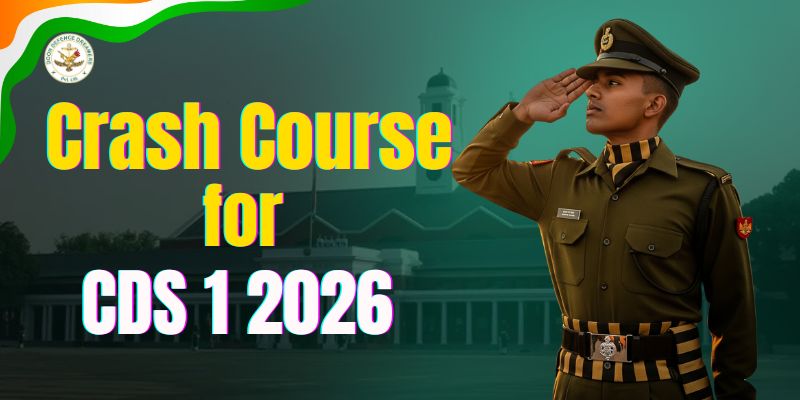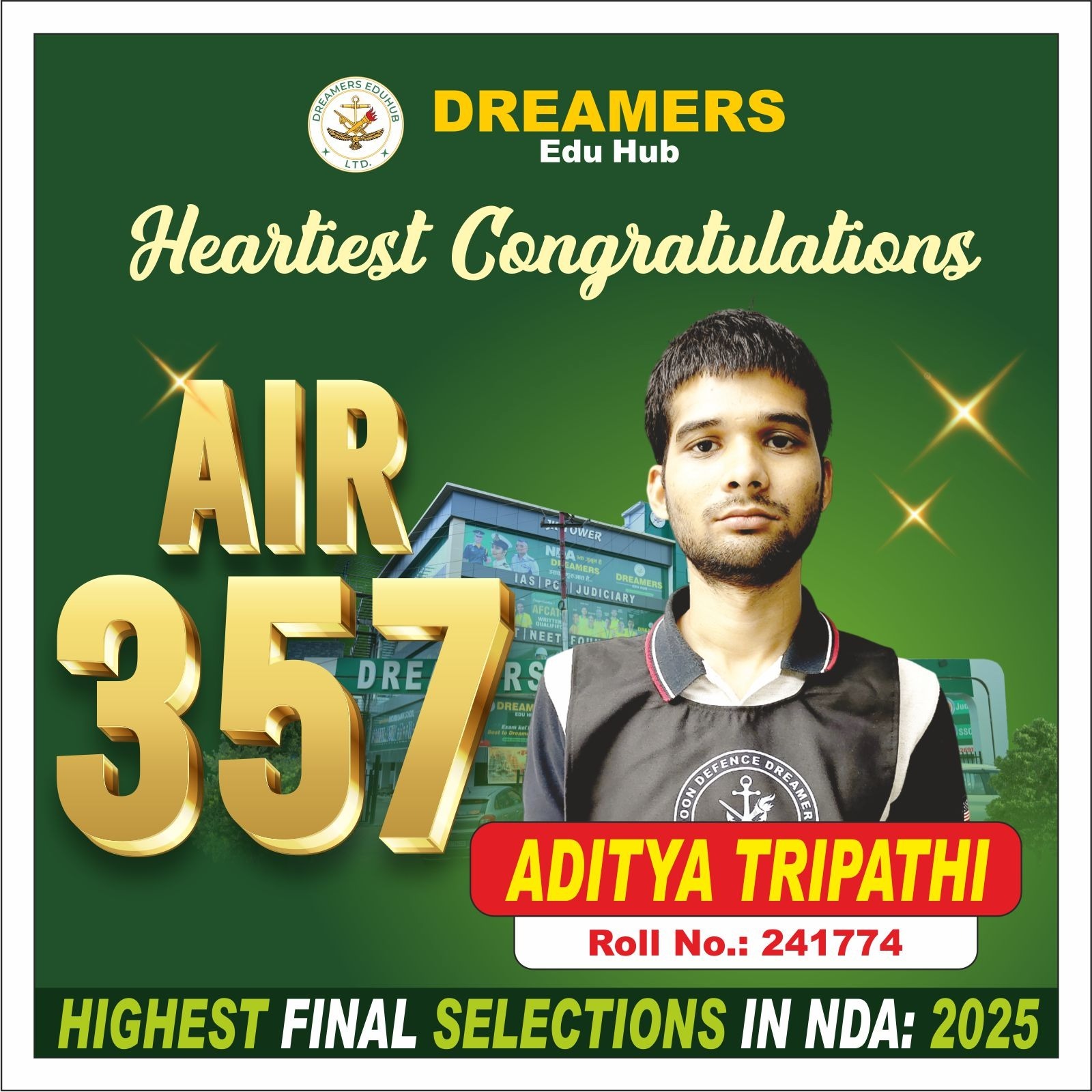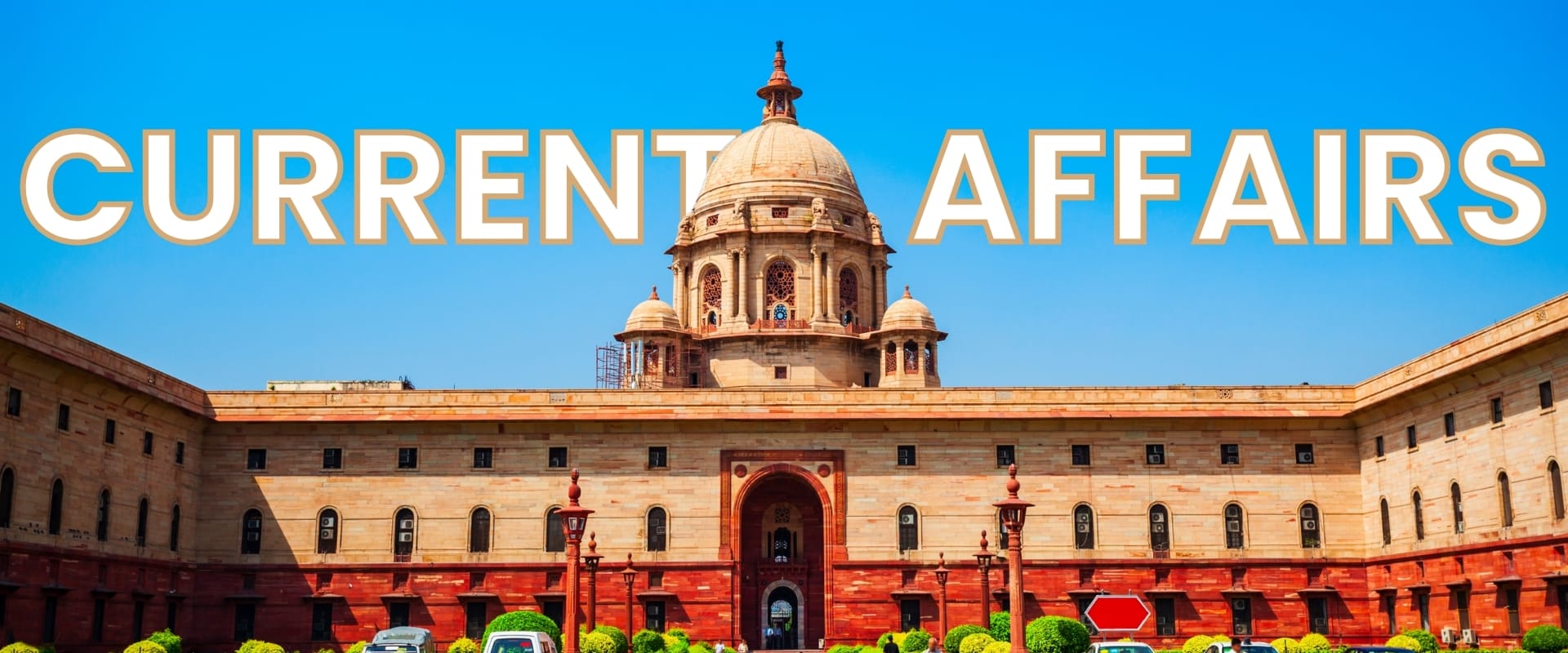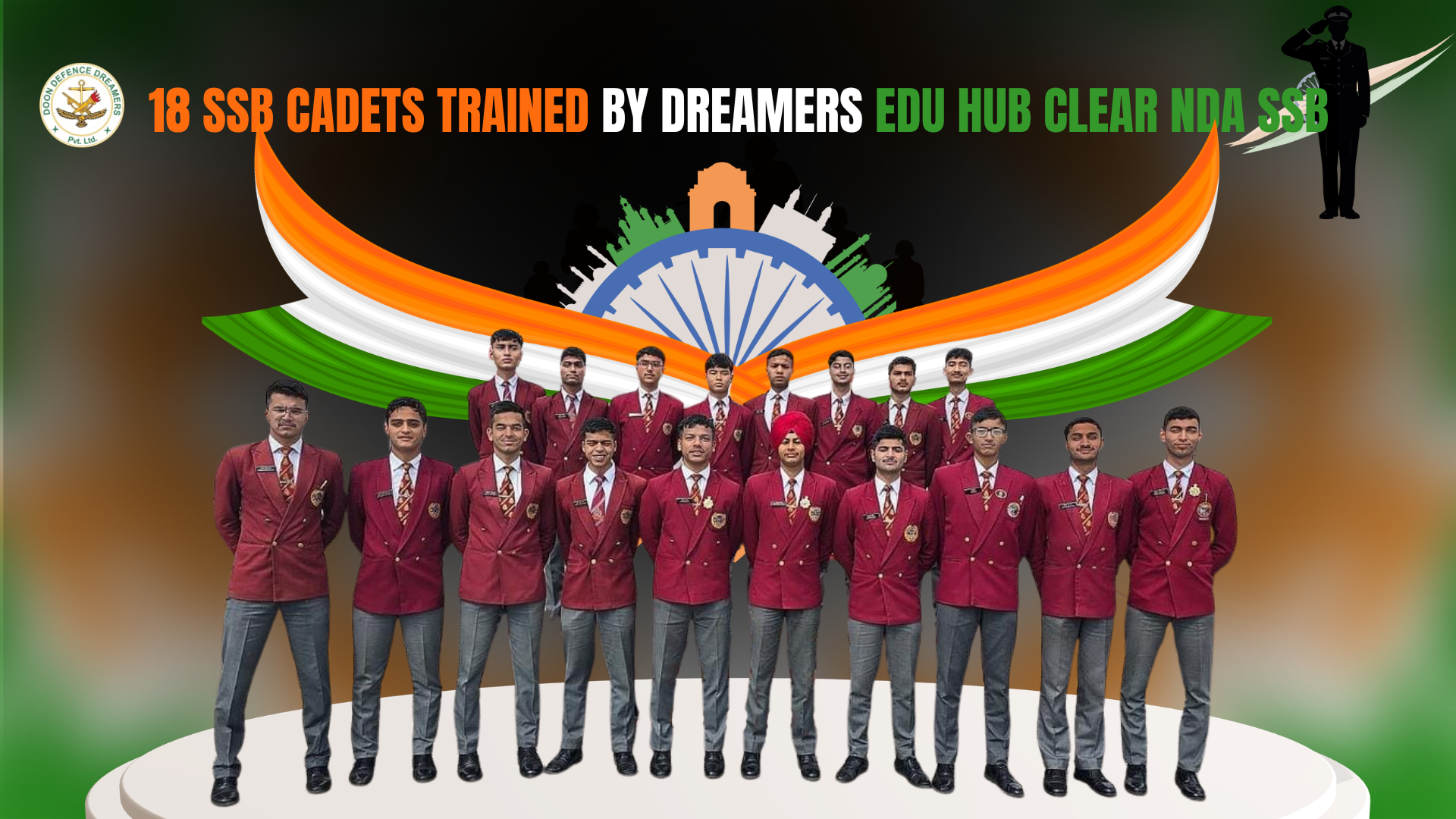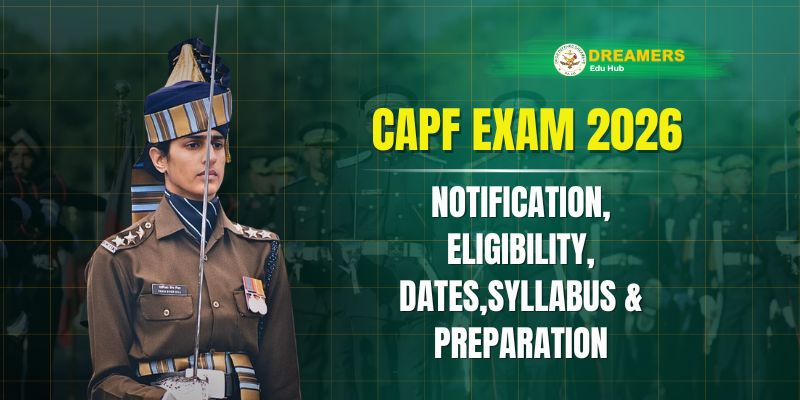The Combined Defence Services (CDS) examination, conducted by the Union Public Service Commission (UPSC), is a crucial pathway for graduates to join the Indian Military Academy (IMA), Indian Naval Academy (INA), Air Force Academy (AFA), and Officers’ Training Academy (OTA) as commissioned officers. The CDS 1 2026 exam offers a significant opportunity for young aspirants to secure a respected leadership role in the Indian Armed Forces. The CDS selection process is highly prestigious, recognizing candidates with both academic acumen and officer-like qualities, which are essential for leading the nation’s defence. Recognizing this importance and the need for focused preparation, the Doon Defence Dreamers (DDD) Institute has officially launched the Crash Course for CDS 1 2026.
CDS 1 2026 Exam Overview
The CDS 1 2026 written exam is tentatively scheduled for April 12, 2026. The CDS exam pattern varies slightly depending on the academy a candidate applies for:
- IMA, INA, AFA: Candidates appear for three papers: English, General Knowledge, and Elementary Mathematics. Each paper is allotted a duration of 2 hours and carries 100 marks.
- OTA (Officers’ Training Academy): Candidates appear for only two papers: English and General Knowledge. Each paper carries 100 marks and is of 2 hours duration.
The General Knowledge paper covers topics across Science, Social Studies, and Current Affairs. CDS graduates embark on a journey defined by honor, discipline, and selfless service, transforming into capable leaders who uphold the highest standards of the military profession.
Exam Dates and Eligibility Criteria
Preparing for the CDS 1 2026 exam begins with a clear understanding of the timelines and mandatory requirements. UPSC decides the official dates, and candidates must adhere strictly to all eligibility rules.
| Event | CDS 1 2026 |
|---|---|
| Notification release | 10 Dec 2025 |
| Last date to apply | 30 Dec 2025 |
| Exam date | 12 Apr 2026 (Sunday) |
Eligibility Criteria
| Criteria | Requirement |
| Nationality | Indian citizen or as per UPSC notification clauses |
| Age | Varies by Academy (check exact DOB range in official notification) |
| Education | IMA, OTA: Degree from a recognized University. INA: Degree in Engineering. AFA: Degree with Physics and Maths at 10+2 level, or a Bachelor of Engineering. |
| Marital Status | Unmarried (except for certain OTA-specific entries) |
| Medical Standards | As per defence medical guidelines (vision, height/weight, etc.) |
Overview of CDS Exam Pattern and Syllabus
The CDS selection process includes a written examination followed by the Services Selection Board (SSB) Interview.
| Paper | Subject | Maximum Marks | Duration | Marking for Correct Answer | Negative Marking |
| Paper I | English | 100 | 2 Hours | 0.83 Marks | -0.27 Marks |
| Paper II | General Knowledge | 100 | 2 Hours | 0.83 Marks | -0.27 Marks |
| Paper III | Elementary Mathematics | 100 | 2 Hours | 0.83 Marks | -0.27 Marks |
| Total (IMA/INA/AFA) | 300 Marks | ||||
| Total (OTA) | 200 Marks |
Elementary Mathematics Paper: Key Topics and Marks Distribution
This paper, only for IMA, INA, and AFA with emphasis on practical application. A strong foundation in the following high-weightage topics is crucial:
- Arithmetic: Number System, Simplification, Time & Work, Speed & Distance, Simple & Compound Interest.
- Algebra: Basic operations, Quadratic Equations, Polynomials, Indices.
- Trigonometry: Heights & Distances, Ratios, Identities.
- Geometry: Lines, Angles, Triangles, Quadrilaterals, Circles.
- Mensuration: Area and Volume of 2D and 3D shapes.
- Statistics: Tabulation, Frequency Distribution, Graphical Representation.
General Knowledge and English Breakdown
Part A: English (100 Marks)
This section aims to test the candidate’s understanding of English and command over the language. Key areas include:
- Grammar and Usage
- Vocabulary (Synonyms, Antonyms, Cloze Test)
- Comprehension and Ordering of Words/Sentences
- Spotting Errors and Sentence Improvement
Part B: General Knowledge (100 Marks)
This is a comprehensive section covering Science, Social Studies, and Current Events. The focus is on a broad awareness of national and international developments:
| Section | Key Topics |
| Science | Physics, Chemistry, and Biology (Class 10th standard, with focus on daily applications) |
| History & Geography | Indian History (emphasis on Freedom Movement), Indian Constitution, World/Indian Geography, Culture |
| Current Events | National and International Importance, Defence-related news, Sports, Awards (from the last 6-8 months) |
| Polity & Economy | Indian Political System, Constitution, Basic economic concepts |
3 Months Crash Course for CDS 1 2026 at Doon Defence Dreamers?
An intensive study plan, such as a 3 months crash course for CDS starting on 5th January 2026 in DDD, is ideal for candidates who have covered their graduation fundamentals or are seeking a focused, disciplined final push. Such a course drastically increases the chances of success by structuring the vast syllabus into manageable, high-yield targets within a short time frame.
The Doon Defence Dreamers (DDD) Institute in Dehradun is consistently recognized for its exceptional track record in CDS and NDA preparation. This is evidenced by the staggering achievement of 710+ students clearing the NDA/NA (II) 2025 written examination, setting a new benchmark in defence coaching. DDD’s focused 3-Month Crash Course for CDS 1 2026 begins on 5 January 2026, providing a timely, structured pathway from core concepts to full-length mocks before the February 1st exam.
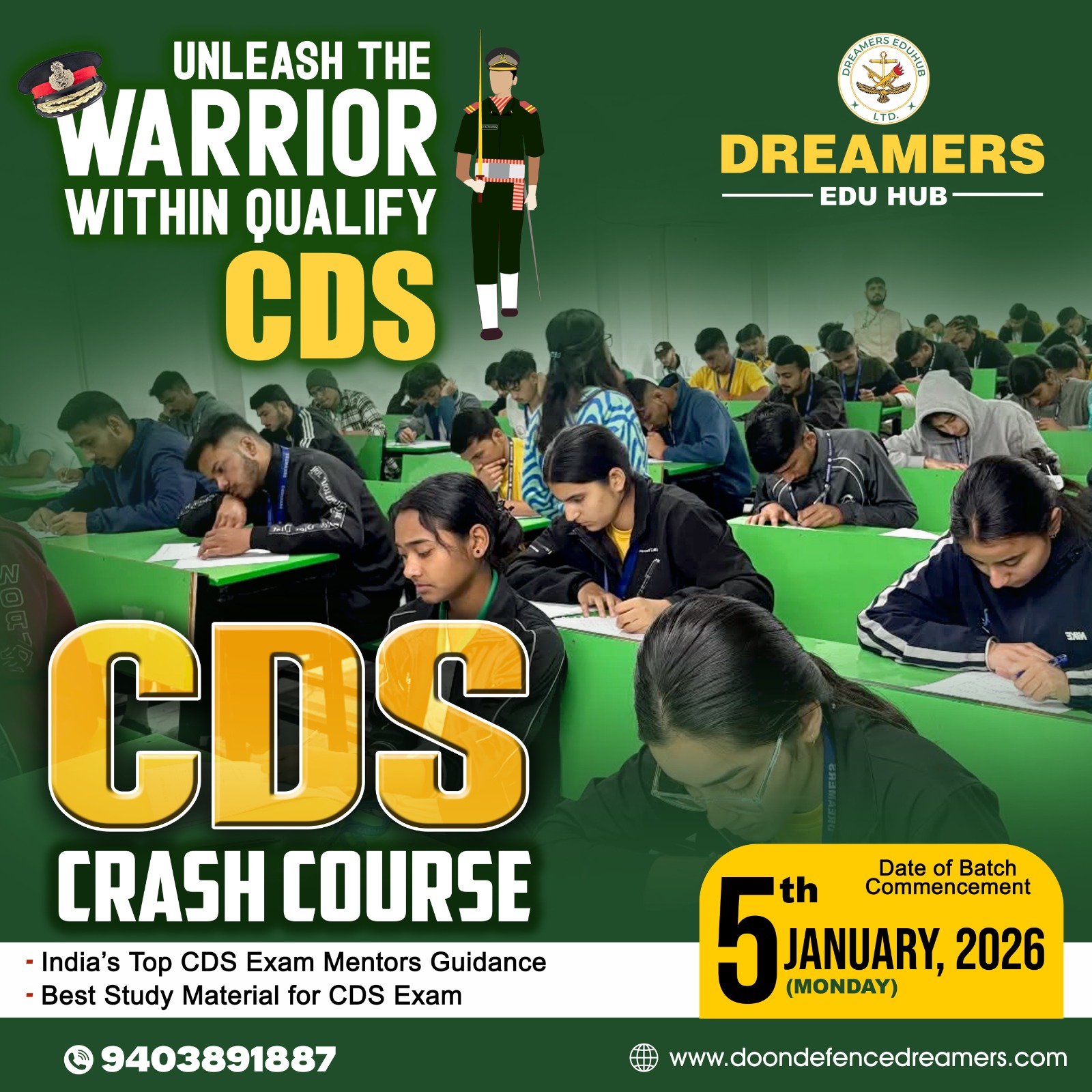
Benefits of an Intensive Study Plan
- Structured Time Management: Converts the limited days into a daily, hourly plan, ensuring balanced coverage of English, GK, and Maths.
- Targeting High-Weightage Topics Efficiently: Focus shifts to mastering exam-critical areas where maximum questions are expected, ensuring higher score returns on study time.
- Constant Evaluation: Daily practice and weekly mock tests provide continuous, quantifiable feedback, allowing for immediate correction of errors and weaknesses under exam conditions.
Doon Defence Dreamers legacy of Excellence
DDD’s reputation is built on its expert faculty, unparalleled results, and innovative teaching methods.
- Experienced Faculty: The teaching staff includes a blend of top subject experts and experienced defence background mentors (Ex-SSB Presidents/Interviewing Officers), ensuring students receive both subject mastery and vital insight into the life of an officer and the SSB process.
- Proven Results: DDD consistently produces top results in both written and SSB phases for CDS aspirants.
- Comprehensive Courses: DDD offers various courses designed for every stage of an aspirant’s journey:
- CDS Coaching + SSB Training
- CDS Foundation Course
- SSB Training (for CDS Qualifiers)
- NDA/CDSE Coaching
DDD’s commitment ensures that the preparation extends beyond the written exam, emphasizing the officer-like qualities needed for SSB success.
Crash Course for CDS 1 2026: Month-wise Study Plan
Month 1: Focus on Core Subjects and Foundation Building (Jan 5 – Feb 4)
This month must be dedicated to establishing core strength in English Grammar and the fundamentals of Elementary Mathematics (for IMA/INA/AFA).
- English: Prioritize Grammar rules, Spotting Errors, and building Vocabulary. Allocate 1.5-2 hours daily for clarity and application practice.
- Mathematics (IMA/INA/AFA): Master Arithmetic and basic Algebra. Allocate 2-3 hours daily for conceptual understanding and problem-solving.
- General Knowledge (Science & Polity): Cover fundamental Physics, Chemistry, and the basics of the Indian Constitution from NCERT books.
Month 2: General Knowledge, PYQs, and Maths Practice (Feb 5 – Mar 4)
With the foundation set, the focus shifts to maximizing the General Knowledge score and rigorous practice.
- Mathematics: Begin rigorous practice of Geometry, Mensuration, and Trigonometry. Start solving chapter-wise Previous Year Questions (PYQs) for speed.
- General Knowledge (Social Studies & Current Affairs): Dedicate time to History, Geography, and intensive tracking of Current Events from the last 6 months (especially defence and international affairs).
- Full-Length Mocks: Start taking one full-length mock test (2-3 papers) every weekend to simulate exam conditions and identify weak areas across all subjects.
Month 3: Revision, Mock Tests, and Time Management Strategies (Mar 5 – Apr 1)
The final month is purely for consolidation, speed, accuracy, and developing an effective exam-taking strategy.
- Revision: The majority of time should be spent revising short notes, formulas, and GK facts. Focus on the most common mistake areas identified in the mock tests.
- Mock Test Marathon: Increase the frequency to 2-3 full-length mock tests per week. Analyze the results immediately to learn from mistakes and refine strategy.
- Time Management Drill: Practice solving papers within the 2-hour limit for each subject, focusing on maintaining composure and accuracy under pressure, especially in the GK paper.
Essential Study Material
Recommended Books and Online Resources for CDS
- NCERT Textbooks (9th to 10th for Maths, 9th to 12th for Science/Social Studies): The fundamental resource for Mathematics and GK. UPSC questions are heavily based on NCERT facts.
- Objective Problem Books: For Mathematics, dedicated objective practice books (similar to those used for SSC/Railways) are essential for speed.
- DDD Study Material: The structured and exam-focused study packages provided by Doon Defence Dreamers, tailored to the latest UPSC CDS patterns, are invaluable for targeted preparation.
Importance of Previous Year Question Papers and Mock Tests
Previous Year Question Papers (PYQs) are non-negotiable. They reveal the UPSC’s question-setting patterns, the frequency of topics, and the depth of knowledge required for each section. Mock Tests are the ultimate tool for practicing time management and identifying a candidate’s peak performance strategy. Regular mock tests are a core part of the DDD curriculum, simulating the real exam to build confidence and endurance.
DDD Tips and Tricks For CDS 1 2026
Effective Time Management Techniques
- Prioritize: In the GK paper, attack the easy, known questions first. In Maths, divide the 2 hours effectively between Arithmetic/Algebra and Geometry/Trigonometry.
- Dedicated Slotting: Allocate fixed, non-negotiable daily slots for Maths practice, English development, and GK memorization. DDD encourages the use of a daily timetable with clear, measurable targets.
- 2-Hour Simulation: Always solve mock tests for each paper in a single, uninterrupted 2-hour block, mimicking the actual exam timing.
Handling Negative Marking and Exam Stress
The CDS exam has a significant negative marking system (-0.27 Marks per incorrect answer), which can severely impact the final score and cut-off clearance.
- Strategy for Negative Marking: Prioritize accuracy over attempts. It is better to leave a question unanswered than to risk losing of the marks. DDD trainers guide students on an optimal attempt range to clear both sectional and overall cut-offs.
- Managing Exam Stress: The path to being an officer is a test of mental resilience. Regular physical training (PT) and maintaining a disciplined routine, a key feature of the DDD residential program, are crucial for stress management. A calm, well-rested mind performs significantly better on the examination day.
Frequently Asked Questions (FAQs)?
Q. What are the minimum qualifying marks a candidate must secure to clear the CDS 1 2026 written exam?
To qualify for the SSB, the UPSC typically stipulates that candidates must secure a minimum of 20% marks in each of the papers. This means at least 20 marks in English, 20 marks in General Knowledge, and 20 marks in Elementary Mathematics (if applicable). Furthermore, a candidate’s aggregate score must exceed a certain overall written cutoff, which historically varies significantly between OTA and the other academies (IMA/INA/AFA).
Q. Is Elementary Mathematics mandatory for all candidates appearing for the CDS 1 2026 exam?
No, Elementary Mathematics is only mandatory for candidates applying for the Indian Military Academy (IMA), Indian Naval Academy (INA), and Air Force Academy (AFA). Candidates applying only for the Officers’ Training Academy (OTA) (both Men and Women) are exempted from the Elementary Mathematics paper and only appear for English and General Knowledge.
Q. How is the negative marking structured in the CDS written exam, and what is the best strategy to handle it?
The negative marking is structured with a deduction of 0.27 marks for every incorrect answer in all three papers (English, General Knowledge, and Elementary Mathematics), where each question carries 0.83 marks. The best strategy is to prioritize accuracy over the number of attempts; candidates should only attempt a question when they have a high degree of certainty, as excessive guessing can severely reduce the final score and may lead to a sectional cut-off failure.
Q. What is the main benefit of focusing on Previous Year Question Papers (PYQs) and mock tests during the final month of the crash course for CDS 1 2026?
The final month is dedicated to a Mock Test Marathon and Revision, which is crucial for building exam-day strategy and endurance. Solving PYQs and mock tests in the last month helps candidates to identify the UPSC’s repeated question-setting patterns, practice solving the entire paper within the stipulated 2-hour time limit for each subject, and provides continuous, realistic feedback to immediately correct mistakes and refine time management.


